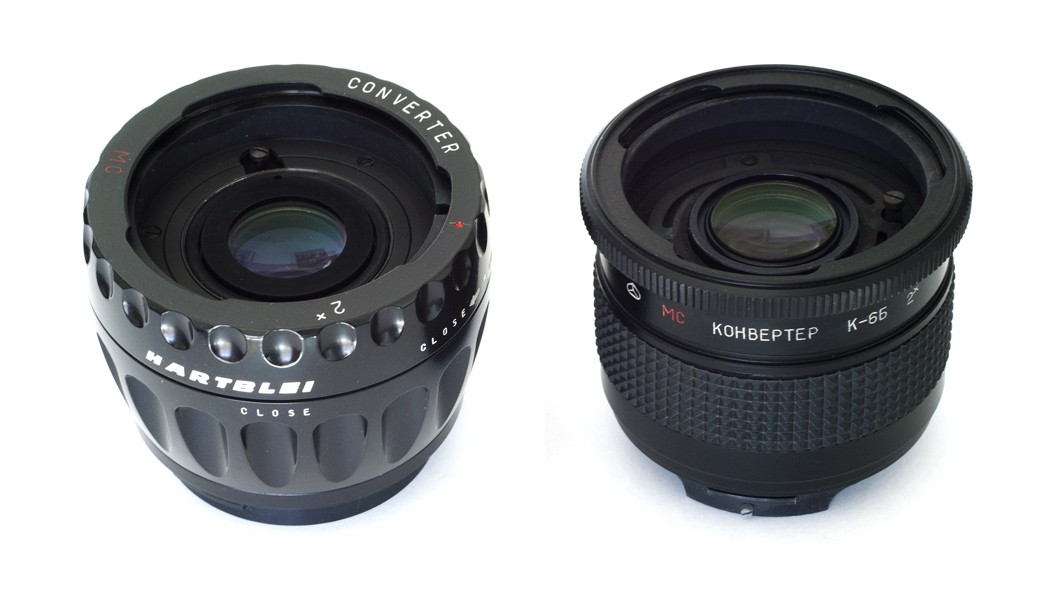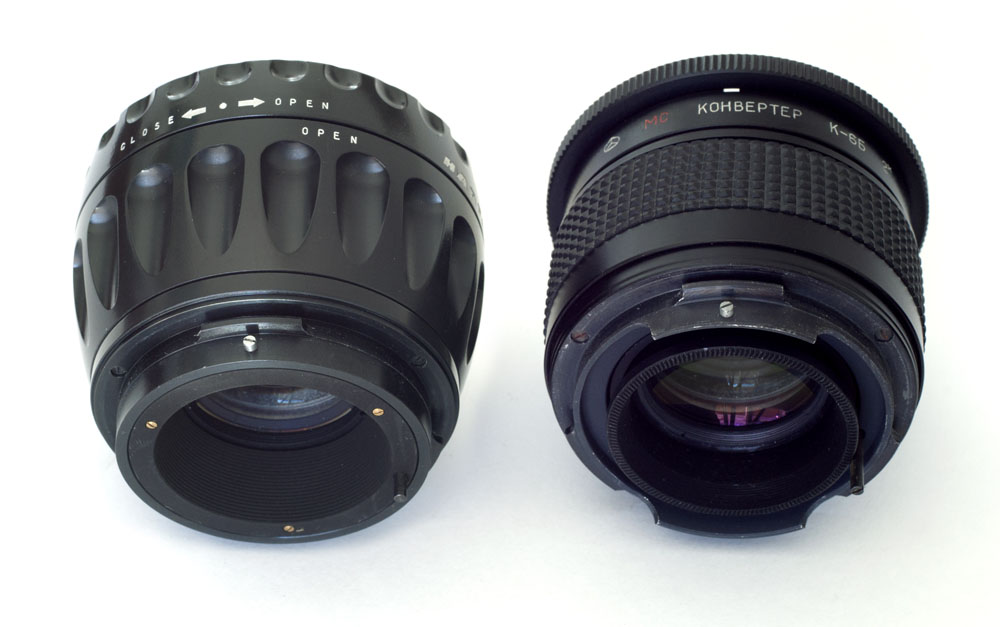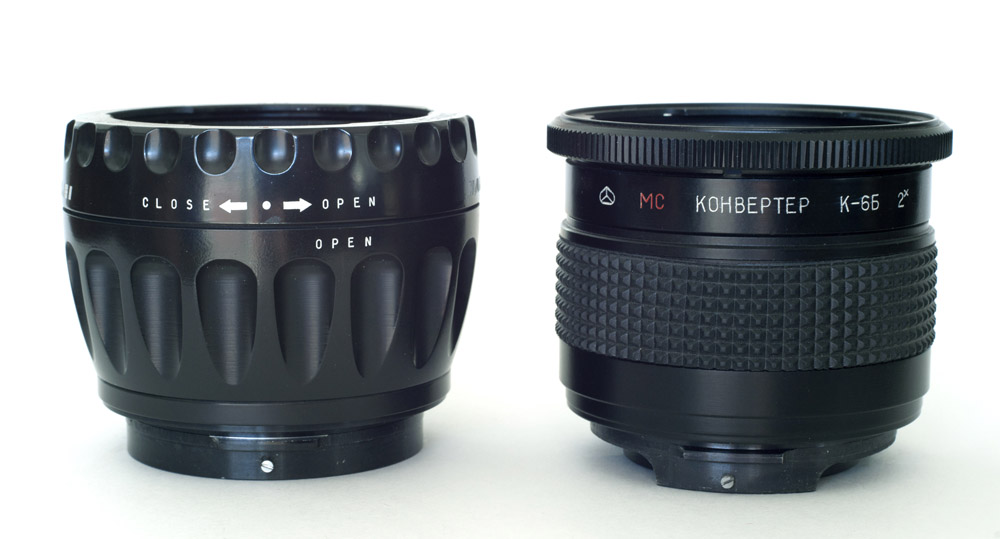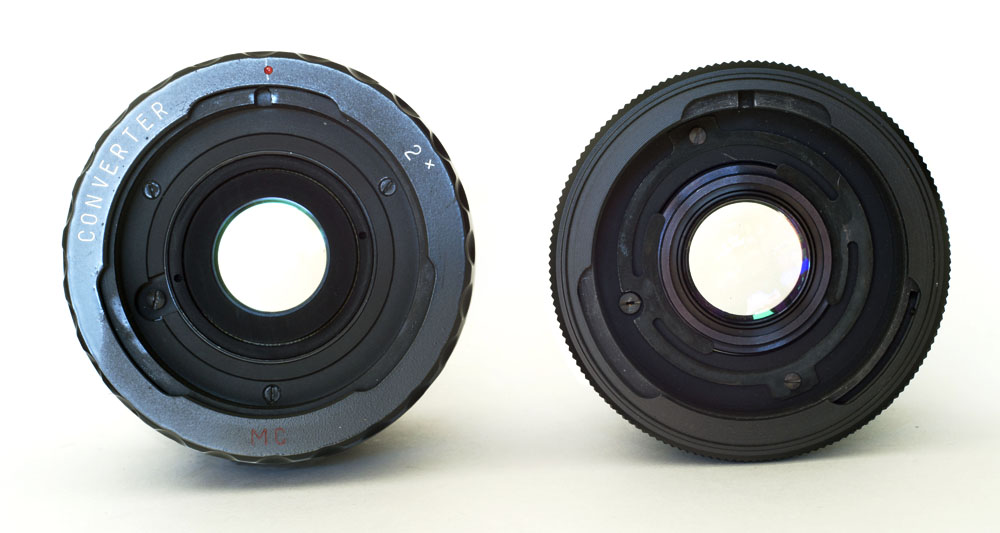
In this picture and those that follow, the
Hartblei converter is on the left, and the original Arsenal
version is on the right.
[htbl2_1.jpg]
The Hartblei 2× teleconverter
Hartblei lenses have a reputation for quality. In approximately the first decade of the 21st century, various lenses with the “Hartblei” name appeared. As far as I can determine, during those years they all used the unmodified optical components of lenses manufactured by the Arsenal factory in Kiev, Ukraine.
However, the lenses that bore the Hartblei name were improvements on the Arsenal originals. This appears to have been down to several factors:
Here we are looking at the Hartblei 2× converter.

In this picture and those that follow, the
Hartblei converter is on the left, and the original Arsenal
version is on the right.
[htbl2_1.jpg]
The following points immediately strike us:
| Hartblei 2× converter | Arsenal 2× converter | |
| Length from front to back 1 | 67mm | 68mm 2 |
| Maximum diameter | 83mm | 73mm |
| Weight | 480g | 275g |
Notes
1 Not including aperture pin
2 The difference corresponds to the slight
difference in depth of the rear of the converter that protrudes
into the camera body. It does not affect the distance from
the camera of the rear surface of the lens that is used with the
converter.

[htbl2_5.jpg]


The pin that retains auto-aperture operation can
be seen as a screw-head at the “8.00 o’clock” position in each
converter.
[htbl2_4.jpg]
The Arsenal converter is functional and
workmanlike, and it works as it should. The Hartblei
converter is also functional, but it is in addition smooth to
handle and a pleasure to hold. Rotating the lens locking
ring (in the direction indicated by the arrow!) again reveals a
smoothness that is missing from the Arsenal converter, where the
locking ring squeaks as it is rotated.
However, when I was planning for a recent trip
and wanting to take a 2× converter, I looked at this Hartblei
converter and at the original, Arsenal, version, and took the
Arsenal converter with me, because it is significantly smaller
and somewhat lighter than the Hartblei converter.
Use as an
extension tube?
There is one major difference between these two converters. In the Arsenal 2× converter, it is possible to remove the optical component and use the empty barrel as an extension tube for close-up or macro work. This is not possible with the Hartblei converter. You may even say that in this the Arsenal converter scores over the Hartblei product.
So was that a stroke of genius by the Arsenal designers, and why was it dropped by Hartblei in their modification of the basic product? I don’t know, but I can guess.
To get the maximum results optically, the lens elements in the converter must be exactly aligned and correctly spaced in relation to the lens or lenses with which they are to be used. It always seemed to me that if I removed the optical component of the Arsenal converter in order to take some macro shots, and then replaced it crooked, crossed the threads, did not insert it far enough, or inserted it too far, I could ruin the results with whatever lens that I used it for.
Also, in a real-life field situation, removing and replacing the optical elements from the barrel without planting fingerprints on at least one of the surfaces was likely to be difficult.
Next, where was I going to put the optical elements when they were out of the converter, to protect them from scratches to the lens surfaces?
When one realises that the Kiev 60 was for many years supplied with two extension tubes, the need to use the converter minus its optical components is difficult to justify. For at least the past 20 years, the two Arsenal extension tubes have also been readily available second-hand, and for at least the last 40 years the East German extension tubes have been easily obtainable in various countries, including in the USA and the UK for at least some of that time.
And so it is perhaps easy to understand why
Hartblei decided that this was a feature that it did not need to
incorporate; it was going for quality and precision, not
cheapness. I think that they were right.
Performance
How do they perform? The Arsenal converter
(the very one shown in these photos) has been extensively used
over a number of years for tests on this website, and of course
for “real world” photography. The results of some of those
tests can be seen in the “Lens test” section. Some of the
most demanding tests are reported on here.
Use with the 150mm
Hartblei lens
Stylistically, the Hartblei 2× converter looks very attractive when combined with the Hartblei 150mm lens. See more details in the report on the 150mm Hartblei lens, here.
I have not yet received back from processing tests with the Hartblei converter. However, since it is optically identical and possibly has a superior multi-coating, it is likely to be equally good and probably indistinguishable in most situations, with possibly marginal improvements of contrast in difficult “against-the-light” or contre-jour shots.
It is definitely a pleasure to have and to hold.
To return to the introductory page on teleconverters, click here.
To go on to the next section, a test of the
Hartblei 45mm shift-only lens, click here.
To go back to the beginning of the Lens Data
section, click below and then choose the range of lenses that
you want to read about.
Back to beginning of the
Lens Data section
To go back to the beginning of the lens tests,
click below and then choose the focal length that you want to
read about.
Back to beginning of lens
tests
© TRA December 2012 , Latest
revision: August 2017